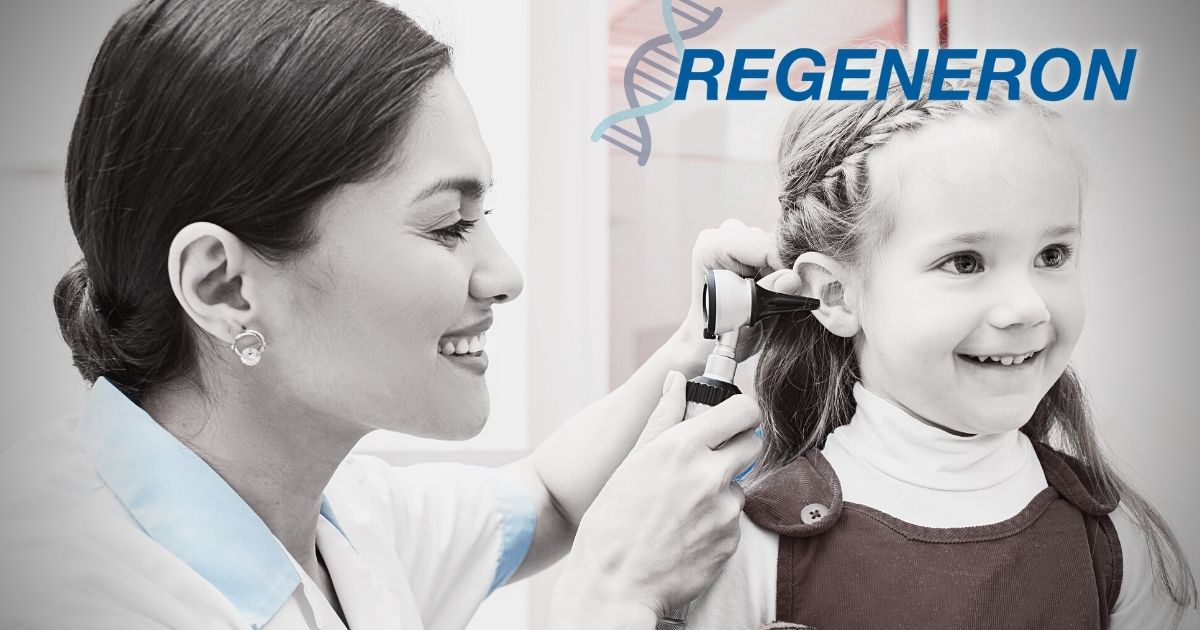TARRYTOWN, NEW YORK – Regeneron Pharmaceuticals, Inc. reported promising safety and efficacy outcomes from the first patient under the age of two enrolled in the Phase 1/2 CHORD trial. This trial focuses on otoferlin gene therapy (DB-OTO) for children with profound genetic hearing loss stemming from otoferlin gene mutations.
Children with profound hearing loss due to otoferlin gene mutations face the challenge of inactive auditory circuits. Cochlear implants are a common treatment, but they cannot fully replicate the complexity and range of sound. The preliminary DB-OTO results indicate the potential of this gene therapy to reactivate auditory circuits, offering hope for improved hearing in these children.
“The children who are being enrolled in CHORD are often born with profound hearing loss due to mutations in a single gene, otoferlin, which essentially turns off their auditory circuits. Cochlear implants are the current standard of care but are unable to replicate the full complexity and range of sound. With these very preliminary DB-OTO results, we now have encouraging evidence that this gene therapy may be able to help turn these auditory circuits back on. We look forward to following this child and others further to determine if DB-OTO gene therapy can restore clinically meaningful hearing as they are learning to interact with the world.”
–Prof. Manohar Bance, M.B., Ear Surgeon and Principal trial investigator at Cambridge University Hospitals NHS Foundation Trust in the UK
Hearing Loss Gene Therapy Trial of DB-OTO
During the trial, a child received an intracochlear injection of DB-OTO in one ear, and, at follow-up assessments, showed improvements in auditory responses through week 6. Auditory brainstem response (ABR) and behavioral audiometry revealed these improvements, with no concerning safety signals observed during this period.
Congenital hearing loss is a significant unmet medical need, affecting around 1.7 out of every 1,000 children born in the U.S. While hearing loss caused by otoferlin gene mutations is rare, the majority of permanent congenital hearing loss cases in developed countries result from single gene defects, making them suitable candidates for gene therapy.
DB-OTO’s preliminary results offer early proof of concept for otoferlin-related hearing loss, with potential implications for the treatment of more common forms of genetic hearing loss. This research aligns with Regeneron’s commitment to advancing gene therapies in the field of auditory medicine.
DB-OTO, initially developed in collaboration with Decibel Therapeutics, became part of Regeneron following their acquisition of Decibel Therapeutics in September 2023. Regeneron’s clinical efforts also encompass AAV.103 for GJB2-related hearing loss and AAV.104 for STRC-related hearing loss.
About the CHORD Trial
The CHORD trial (NCT# 05788536) is a Phase 1/2 first-in-human, multicenter, open-label trial to evaluate the safety, tolerability, and preliminary efficacy of DB-OTO in pediatric patients with otoferlin mutations.
Currently enrolling children across sites in the U.S., United Kingdom and Spain (<18 years of age; staggered by age in the U.S.), CHORD is being conducted in two parts. In the initial dose-escalation cohort (Part A), patients will receive a single intracochlear injection of DB-OTO in one ear, while in expansion cohort (Part B), patients will receive single intracochlear injections of DB-OTO in both ears at the selected dose from Part A.
Additional information about the trial, including enrollment, can be obtained by contacting clinicaltrials@decibeltx.com or 1-617-370-8701.
About DB-OTO
DB-OTO is an investigational cell-selective, adeno-associated virus (AAV) gene therapy designed to provide durable, physiological hearing to individuals with profound, congenital hearing loss caused by mutations of the otoferlin gene. The treatment aims to deliver a working copy of the faulty otoferlin gene using a modified, non-pathogenic virus that is delivered via an injection into the cochlea under general anesthesia (similar to the procedure used for cochlear implantation). In this gene therapy, the introduced otoferlin gene is under the control of a proprietary cell-specific Myo15 promoter, which is intended to restrict expression only to the cells that normally express otoferlin.
DB-OTO received Orphan Drug and Rare Pediatric Disease designations from the U.S. Food and Drug Administration in 2021. In the European Union, Orphan Drug Designation was granted by the European Medicines Agency in 2023.
About Regeneron
Regeneron is a leading biotechnology company that invents, develops, and commercializes life-transforming medicines for people with serious diseases. Founded and led for 35 years by physician-scientists, Regeneron’s unique ability to repeatedly and consistently translate science into medicine has led to numerous FDA-approved treatments and product candidates in development, almost all of which were homegrown in Regeneron’s laboratories. Regeneron’s medicines and pipeline are designed to help patients with eye diseases, allergic and inflammatory diseases, cancer, cardiovascular and metabolic diseases, hematologic conditions, infectious diseases, and rare diseases.
Regeneron is accelerating and improving the traditional drug development process through our proprietary VelociSuite® technologies, such as VelocImmune®, which uses unique genetically humanized mice to produce optimized fully human antibodies and bispecific antibodies, and through ambitious research initiatives such as the Regeneron Genetics Center, which is conducting one of the largest genetics sequencing efforts in the world.
Source: Regeneron






